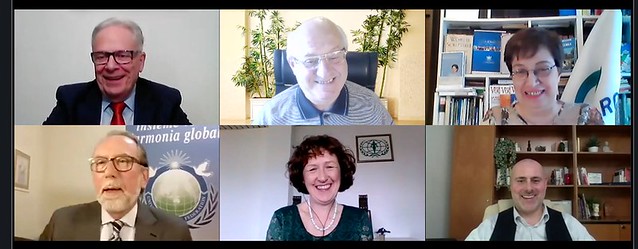Rome, Italy—Anxiety and stress resulting from social distancing were the topics of a webinar held by UPF and an affiliated organization.
About 100 participants attended the second webinar of the Peace Talk series organized by the Italian chapters of UPF and Women’s Federation for World Peace (WFWP). The title of the meeting, held on June 4, 2020, was "Anxiety and Stress in the Family and Outside the Family at the Time of Social Distancing."
WFWP-Italy Vice President Gabriella Mieli introduced the meeting, while WFWP-Italy President Elisabetta Nistri greeted the participants. Carlo Zonato, the president of UPF-Italy, was the moderator; Franco Ravaglioli, the secretary general of UPF-Italy, passed the questions to the speaker, while the technical and directing aspects were in the care of Giorgio Gasperoni, editor in chief of Voci di Pace, the magazine of UPF and WFWP of Italy.
An expert in stress, Dr. Massimo Agnoletti, PhD, a psychologist and a researcher in positive psychology and epigenetic psychology, was the main speaker. We chose the mode of a single speaker in order to carry out a more in-depth and articulated discussion on a particularly sensitive topic.
“Considering the current scenario, COVID-19 has determined a 'before' and an 'after' in our lives,” Dr. Agnoletti said. “The current pandemic is unprecedented for three fundamental factors that have both biological and psychological, as well as social and economic repercussions.”
The first factor, he said, is that COVID-19 is an invisible biological agent that is spreading very rapidly through the strong interconnection of modern sociality.
The second factor is that we are now all aware that the behavior of others can determine our health, even our survival, and therefore also our quality of life, which is perceived as more fragile and vulnerable.
The third factor is that, unlike all other emergencies (earthquakes, floods, fires, etc.), the pandemic requires social distancing that challenges our need for sociality.
These factors produce stress, he said, because we are trying to adapt to the new psychosocial scenario imposed both in terms of the perceived present and an uncertain future, also from an economic point of view. This negative stress is characterized by the poor capacity of control that we perceive in the present or when we cannot predict the outcome of events related to the future.
Temporal orientation is a branch of psychology developed in the last 30 years, according to which our approach to time shapes our lives, he said. The sooner we are aware of it, the sooner we will be able to modify some aspects of our temporal approach in order to live more satisfying, more socially positive and less stressed (in a negative sense) lives.
Dr. Agnoletti explained that temporal orientation sheds light on the style and psychological mode, in a cognitive, emotional and motivational sense, that characterizes each of us, predicting the types of choices and decisions we make in everyday life. In this sense, each of us has his own peculiar configuration linked to "how" and "how much" we invest our psychological resources with respect to our past, present and future experiences. This determines a certain "style" that each of us has, also called "temporal profile," which can change over time, based on the quality and quantity of our experiences, and which shapes the quality of our experiences and our psychology. According to the specific configuration of our temporal profile, we can understand the behaviors to be adopted to improve our psychophysical well-being and communicate more effectively with others, starting with family members.
The three main temporal profiles are summarized and represented by cicadas, ants and tortoises, he said. Each temporal profile has implications for our personal stress management and social relations as well as for our communication. The first step, therefore, is to be aware of one's own temporal profile in order to improve it through specific behaviors and experiences in order to reach our optimal profile.
On the basis of the questions asked by the webinar participants, Dr. Agnoletti developed some practical examples and modalities, relating several examples taken from his clinical practice, on how to identify one's own temporal profile and how to gradually model and improve it toward an optimal temporal profile.

